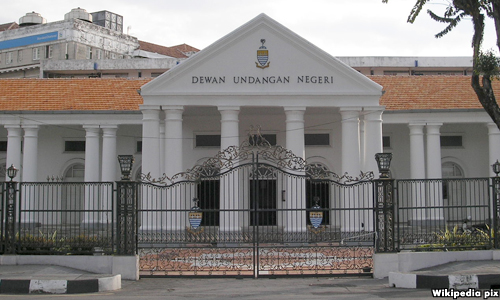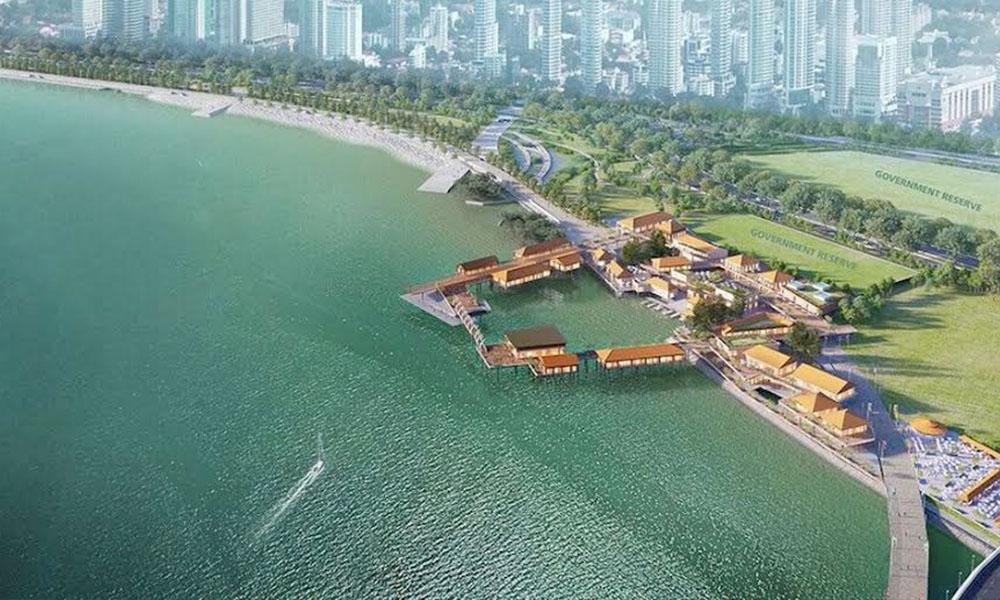COMMENT I was one of two PKR state assemblypersons penalised for abstaining from a motion on land reclamation in the Penang State Assembly sitting recently.
However, I believe questioning mega projects and voting on conscience stops deviations from real issues and will allow us to defend the rights of ordinary Penangites.
1. Massive privatised land reclamation projects increase public concern
First of all, let me emphasise that I am for development and improving our transportation plan for Penang. Of course, there must be transparent information and public consultation processes according to law.
For the past few years, the people of Penang have been showing concern about hill land developments, seafront land reclamation, land swaps and privatisation deals.
Recent news of a few thousand acres of land reclamation, both at the north-east and the south-west of Penang Island, have again raised the eyebrows of environmentalists, NGOs and worried coastal fishermen.
 Some economists and researchers have also questioned whether the projected growth of Penang can justify such massive reclamation and whether the party that benefits from such massive reclamation and land swaps will be the people of Penang.
Some economists and researchers have also questioned whether the projected growth of Penang can justify such massive reclamation and whether the party that benefits from such massive reclamation and land swaps will be the people of Penang.
As elected representatives of the people of Penang, we take heed of the critics, and my state assembly colleagues and I are of course, looking very closely at these issues.
2. State assembly requested further information on PAC’s report on reclamation
A simplified version of PAC Public Accounts Committee's (Major Road and Tunnel Project Report) was given to us at a very late stage during the November 2015 state assembly sitting. The report was brief, and we were left with some unanswered questions.
Though the matter was discussed partially in the state assembly at time, the speaker, Law Choo Kiang, subsequently ordered a new and more complete report to be prepared again for the coming state assembly and its members.
3. Legislators are not backstabbers, neither are we rubber stamps
We are always reminded that any land in the hands of the government belongs to the people. The government is the trustee for the people and it must therefore justify all disposals of public lands, be these existing sites or through reclamation.
With public information and from the PAC report, we, the state assemblypersons, requested more clarification about the pros and cons, costs and details of the privatised mega reclamation and land swap projects.
For a reclamation case situated at the north-east side of Penang Island, we were informed by PAC that the tunnel's "feasibility report" and the required “environmental impact report” had not been completed, and that the government has agreed to pay a large payment of RM138,971,572 for feasibility report and design, and that the sum was approved by the relevant government departments years ago.
The whole feasibility report is worth RM305,003,880 and mainly to be paid with land swaps, which involved exchanges of two lots at Tanjung Pinang and Tanjung Tokong.
 Questions have been raised by few state assemblypersons on the land swaps and reclamations, and we were unsure of how the feasibility tests justify such a large payment and in exchange for the two lots of reclaimed land.
Questions have been raised by few state assemblypersons on the land swaps and reclamations, and we were unsure of how the feasibility tests justify such a large payment and in exchange for the two lots of reclaimed land.
Thus, with the public interest issues raised by the people and the PAC report on reclamation, of the six concerned state assemblypersons, one from DAP chose to vote for the said motion, and five from Keadilan abstained.
4. Issues are on future new reclamations and public hearings
I believe the statement that said: “Review of old reclamations will bankrupt the state” (as opposed to the call for “public interest consultation on new reclamations”) is misleading and incorrect.
The crux of the matter and the issue here is on “review” of ''not yet approved'' and "new" reclamation plans, and to advocate public participation and consultation.
The so-called ''review of old reclamation plans will bankrupt the state" can be seen as an incorrect statement that confuses Penangites.
Logically speaking, what is a “new, future, not yet approved project” cannot be “an old reclamation project”, and therefore will never have the chance to become a rescinded agreement that may even see the current government being sued and made bankrupt, as some would say.
5. Defamation and character assassination stopped us from asking questions
In short, the six state assemblypersons were just voting for “a review and public consultation on new reclamation projects”.
No sane person would be able to understand why a public interest decision like that brought about such tantrums, not to mention continuous vicious abuse and attacks on the six assemblypersons over the past three months.
State assemblypersons were elected by the people of Penang to help scrutinise all aspects of government administration, be it federal, state or council, which we were doing, and will continue to do so.
I just want to ask these questions:
- Is it wrong to defend the interests of Penang?
Then tell us, if the state does not want us to know anything!
6. The abstentions prompted series of public hearings
The reality is that subsequent to the abstentions, the government had started a series of public consultations and public hearing processes to engage the Penangites into understanding the land swap and seafront developments.
It is a good start, and we are eagerly awaiting more information on open tenders and the awarding of some of these mega projects.
7. People's representatives should not be bullied into submission
Although the Penang Hill Corporation has nothing to do with seafront reclamation, the chairperson nevertheless chose to force me out of the board.
I also do not believe that forcing me out has anything to do with my views on Penang Hill development.
As state assemblyperson of Kebun Bunga, Penang Hill is part of my constituency. It is a fact that the management and development of Penang Hill falls under the administration of Penang Hill Corporation.
Depriving any Kebun Bunga state assemblyperson from involvement in the Board of PHC would effectively deprive the Kebun Bunga constituents their constitutional rights to benefits derived from the democratic electoral system.
I believe it is a big mistake the PHC has done, and it may even be illegal, corporately speaking, so I would advise them to rectify, apologise and do the necessary. I will inform my constituents of this grave injustice and continue to assist the people of Penang Hill despite the oppression.
8. United we stand
The forced extraction of me from PHC, which makes up part of my constituency, is ultra vires and a hasty act. I really do not want to be in any part of this manoeuvre, but unfortunately, we are inevitably stuck with it.
I wish to go on serving my constituency, and will continue to act as a state assemblyperson and a Penangite to defend the interests of Penang.
I take this opportunity to call out for all the help we can get, to better Penang, to build Malaysia, and to better our Pakatan Harapan's administration. Thank you for all the support from the people of Penang.
CHEAH KAH PENG is the state assemblyperson for Kebun Bunga, Penang.

